Do 85 rich people have same wealth as half the world?
- Published
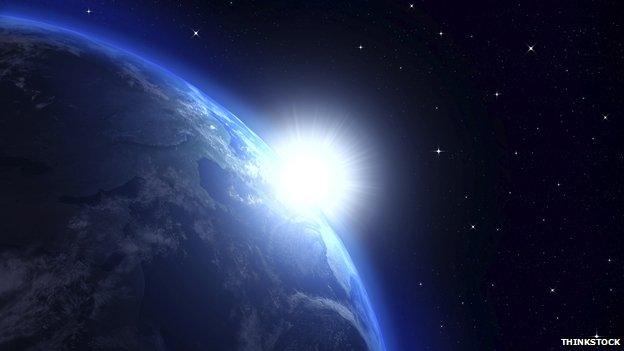
More or Less, the BBC team that investigates numbers and statistics, is often asked to check out claims that readers or listeners to the radio programme find hard to believe.
Here are four often-quoted facts that the team has looked into.
Are the 85 richest people in the world as wealthy as the world's poorest half?
A number of listeners got in touch to ask about this fact, widely reported around the world, from the Washington Post to CNN.
The figure comes from a report by British aid charity Oxfam. It got lots of attention, so the charity produced another figure for the UK, stating that the five richest families had more wealth than the poorest 20%. But how were these figures calculated?
Ricardo Fuentes-Nieva, head of research at Oxfam GB, looked at data from the Global Wealth Report 2013 produced by bank Credit Suisse.
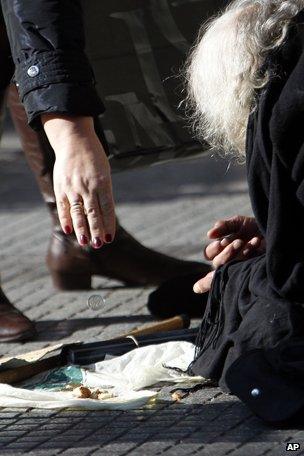
He totted up the total wealth that was attributed to the poorer half of the world's population - less than 1% of the world's wealth, about $1.7tn (£1tn).
He then went to the Forbes rich list and tallied up all the wealth of the top billionaires until he reached 1.7 trillion US dollars, reaching the 85th richest person in the world. The UK figure was calculated in a similar manner - using the Credit Suisse data and the Forbes list.
"We acknowledge, everyone acknowledges, that it has shortcomings but it is as good as it gets," says Fuentes-Nieva.
The comparison has certainly generated headlines but is it reasonable?
There is a problem with Oxfam's comparison because counter-intuitively, low wealth does not mean you are poor, says Dr Anthony Shorrocks, former director of the United Nations University World Institute for Development Economics Research, and one of a number of respected economists behind the Credit Suisse report.
Some people in Western countries who fall into the bottom 50% for wealth may not be poor in the true sense. They might be a graduate in the UK laden with debt and no assets, or a young professional who spends all their income.
The other misconception, according to Deirdre McCloskey, external, professor of economic history at Gothenburg University in Sweden, is that these super-rich individuals have so much wealth that it's making half the world poor.
But if you took all the money of the 85 richest people and gave it to the poor in a one-off payment, she says, it would only increase each person's wealth by about $500 (£300).
Are there one million Maasai in Africa?
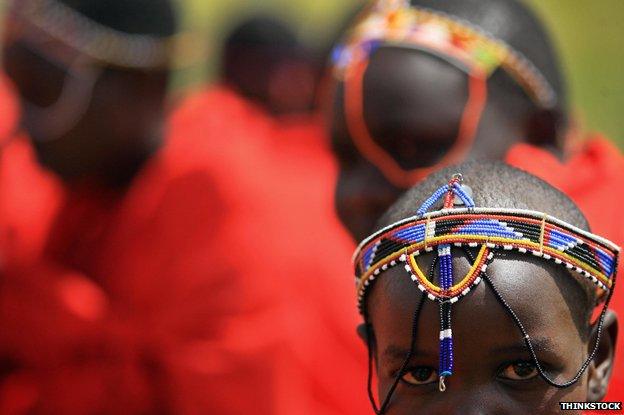
Hans, from the US, has seen this number floating around for 15 years, but where does it come from and is it true?
The Maasai are a traditionally nomadic group which live in the south of Kenya and the north of Tanzania. The figure of one million has been reported all over the place, going back several years.
Dr Ernestina Coast, an associate professor of population studies at the LSE, traced it back to a paper from 1998, but says it doesn't give any supporting evidence for the number.
This 15-year-old statistic made her suspicious, because Kenya collects census information on the number of Maasai in the population, but Tanzania does not.
"In Tanzania a very different approach was taken. It said 'first and foremost we are Tanzanians and our tribal affiliation or ethnic group are much less important.' So they stopped collecting any ethnicity data."
In Kenya's census of 2009, around 840,000 people identified themselves as Maasai.
Some even doubt this number. Kakuta is a Maasai and founder of the Maasai Association, which builds schools and facilities in Kenya.
"In Maasai society, some people are against census taking because traditionally families will not tell you how many children they have.
"So they often refuse to participate in census taking, or give wrong information to the census takers. It is a tradition which goes back for generations and generations," he says.
So the figure of one million has been floating around for years with little evidence. By accident, as a rough figure, it might not be too far off, but we can't know for sure.
Is it true that a quarter of Americans do not know the Earth goes round the sun?
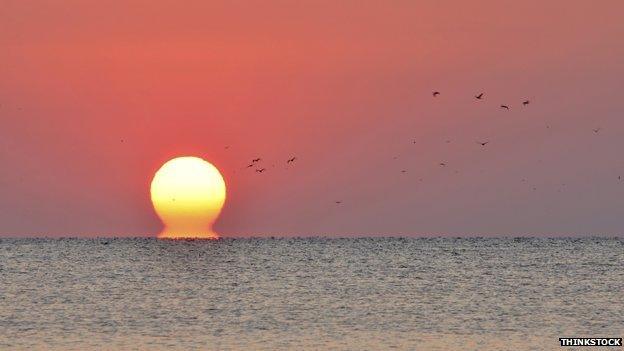
Paul, who lives in Dubai, read in Time magazine that a quarter of Americans and a third of Europeans did not know that the Earth goes round the sun.
The American figure comes from research by the National Science Foundation, a US government agency which has been asking this question as part of its survey of public attitudes to science since 1988.
It asked a range of adults: "Does the Earth go around the sun, or does the sun go around the Earth?"
Tom W Smith, who carried out the poll at NORC, a specialist centre at the University of Chicago, says they sampled a group which reflects the whole population in terms of gender, age, education and ethnicity.
But why would so many people get this wrong? "Most of these questions involve having learned a scientific fact and remembering it," says Dr Smith.
"But if someone goes outside and observes the fact the sun rises in the east and sets in the west each day, that casual non-scientific observation might well lead them to take in the belief that the sun is revolving around the Earth."
The most recent research on this appears to be a European Union survey in 2005 which shows only 66% getting it right.
Here the question is slightly different. "The Sun goes around the Earth - true or false?" So you are not strictly comparing like with like.
But even so, Europeans also fail to get this question right in large numbers.
And other surveys over the past few years show that people in India and Malaysia don't do much better.
Is it true that half of Tasmanians cannot read or write properly?
Alan Walker from Australia got in touch to say he heard a TV broadcast claiming that half of Tasmanians were illiterate and innumerate.
Tasmania is a large, mostly rural island off the south coast of Australia, where half a million people live.
The data comes from a survey of adults aged 15 to 64 in literacy and numeracy skills back in 2012.
The survey ranked participants in five levels of competency - one being the lowest, and five the highest.
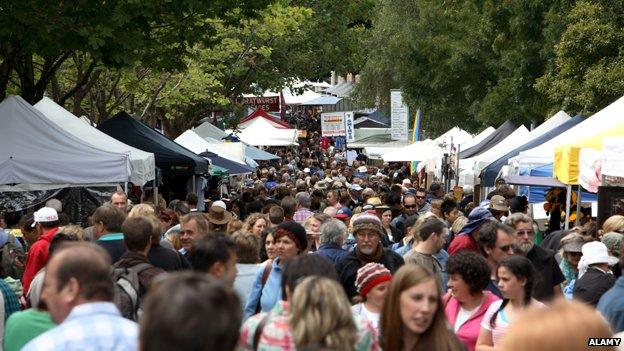
Hobart, Tasmania: Are its citizens any more illiterate than elsewhere in Australia?
Some have argued that ideally people should be at Level Three to be able to cope in a modern economy.
On that basis, half of Tasmanians did not reach that level. But according to Dr Bruce Caldwell, from the Australian Bureau of Statistics, that doesn't mean you are illiterate or innumerate. For example, people at Level One can read a newspaper and pick out basic information.
Tasmania's results are slightly worse than the Australian average, but Dr Caldwell says they are comparable with other parts of the country.
He also gives a reason why Tasmania's results may be lower than the average: "Tasmania's population is slightly older than the national average and test scores tend to decline after about 35 years."
The research was part of a larger international survey run by the OECD. Senior analyst William Thorn says he did not think it was fair to say that half of Tasmanians could not read or write properly - in most advanced countries, very few people cannot read or write.
Follow @BBCNewsMagazine, external on Twitter and on Facebook, external